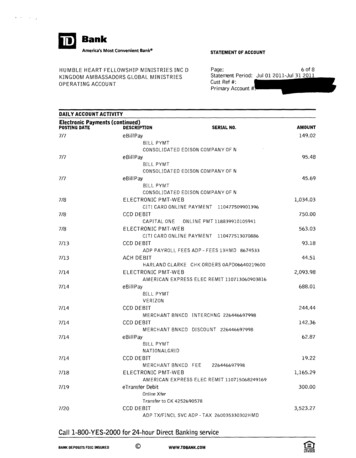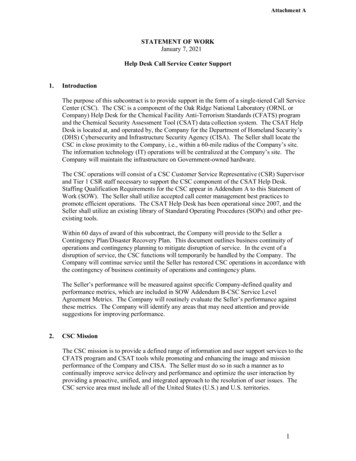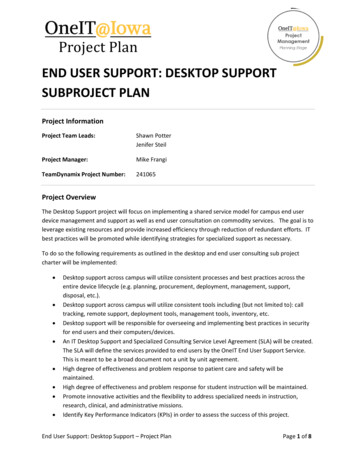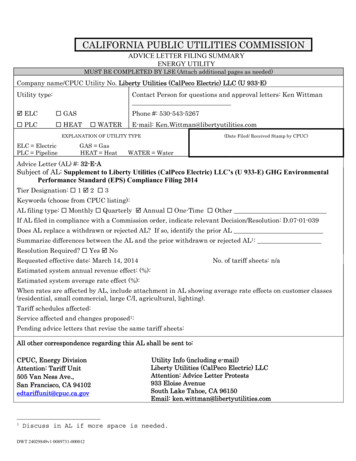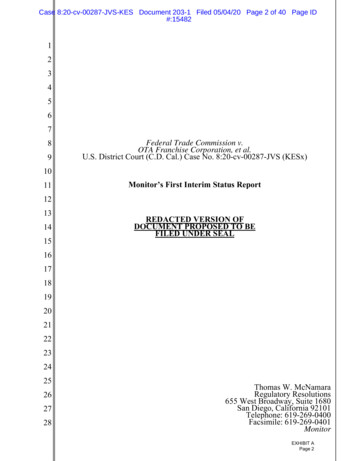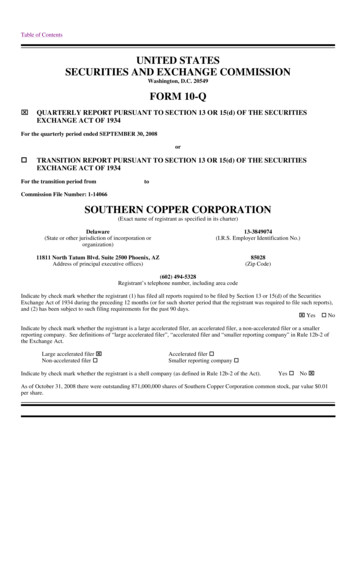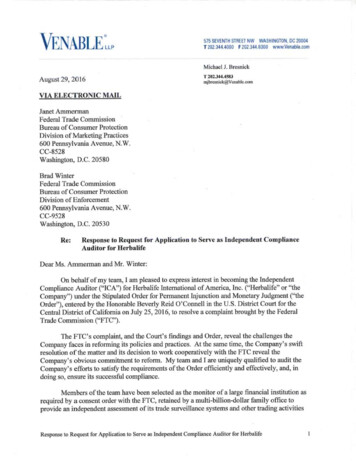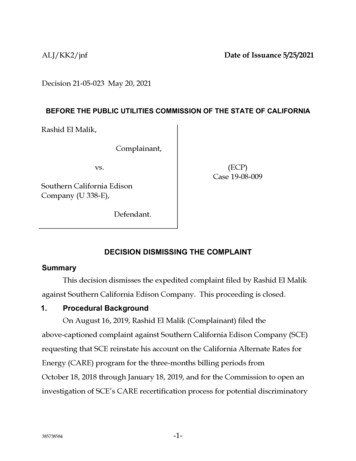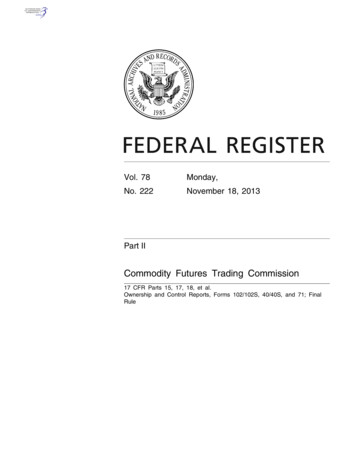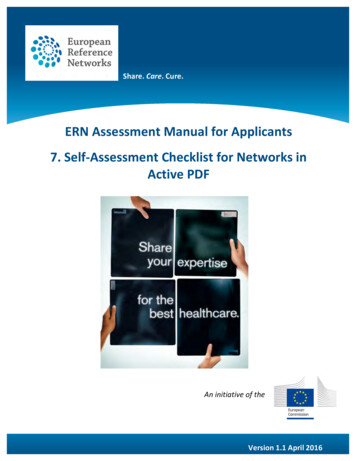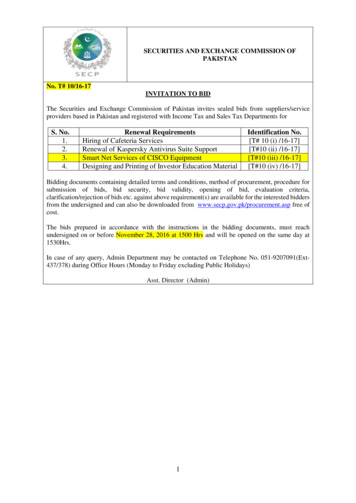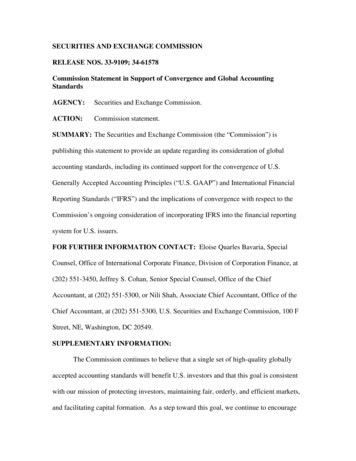
Transcription
SECURITIES AND EXCHANGE COMMISSIONRELEASE NOS. 33-9109; 34-61578Commission Statement in Support of Convergence and Global AccountingStandardsAGENCY:Securities and Exchange Commission.ACTION:Commission statement.SUMMARY: The Securities and Exchange Commission (the “Commission”) ispublishing this statement to provide an update regarding its consideration of globalaccounting standards, including its continued support for the convergence of U.S.Generally Accepted Accounting Principles (“U.S. GAAP”) and International FinancialReporting Standards (“IFRS”) and the implications of convergence with respect to theCommission’s ongoing consideration of incorporating IFRS into the financial reportingsystem for U.S. issuers.FOR FURTHER INFORMATION CONTACT: Eloise Quarles Bavaria, SpecialCounsel, Office of International Corporate Finance, Division of Corporation Finance, at(202) 551-3450, Jeffrey S. Cohan, Senior Special Counsel, Office of the ChiefAccountant, at (202) 551-5300, or Nili Shah, Associate Chief Accountant, Office of theChief Accountant, at (202) 551-5300, U.S. Securities and Exchange Commission, 100 FStreet, NE, Washington, DC 20549.SUPPLEMENTARY INFORMATION:The Commission continues to believe that a single set of high-quality globallyaccepted accounting standards will benefit U.S. investors and that this goal is consistentwith our mission of protecting investors, maintaining fair, orderly, and efficient markets,and facilitating capital formation. As a step toward this goal, we continue to encourage
the convergence of U.S. GAAP and IFRS and expect that the differences will becomefewer and narrower, over time, as a result of the convergence project.The Commission last addressed this topic in November 2008 when it issued aproposed “Roadmap” for a possible path to a single set of globally accepted accountingstandards.1 The Proposed Roadmap generated significant interest and thoughtfulcomment from investors, issuers, accounting firms, regulators, and others regardingfactors that the Commission should consider as it moves forward in its evaluation ofwhether and how to incorporate IFRS into the financial reporting system for U.S. issuers.In addition to reaffirming the Commission’s strong commitment to a single set of globalstandards, the recognition that IFRS is best-positioned to be able to serve the role as thatset of standards for the U.S. market, and the convergence process ongoing between theFinancial Accounting Standards Board (“FASB”) and the International AccountingStandards Board (“IASB”), this statement outlines certain of these factors that are ofparticular importance to the Commission as it continues to evaluate IFRS through 2011.The Commission has directed its staff to develop and execute a work plan (the“Work Plan”) to enhance both understanding of the Commission’s purpose and publictransparency in this area.2 Execution of the Work Plan, combined with the completion ofthe convergence projects of the FASB and the IASB according to their current work plan,will position the Commission in 2011 to make a determination regarding incorporatingIFRS into the financial reporting system for U.S. issuers.1See Roadmap for the Potential Use of Financial Statements Prepared in Accordance with InternationalFinancial Reporting Standards by U.S. Issuers, Release No. 33-8982 (November 14, 2008) [73 FR 70816(November 21, 2008)] (“Proposed Roadmap”).2The Work Plan is included as an appendix to this statement. A summary of the key areas of the WorkPlan is provided in section IV of this statement.2
I.OverviewA.History of the Commission’s Steps to Foster a Single Set of HighQuality Globally Accepted Accounting StandardsThe Commission has long promoted a single set of high-quality globally acceptedaccounting standards.3 This position advances the dual goals of improving financialreporting within the United States and reducing country-by-country disparity in financialreporting. This, in turn, would facilitate cross-border capital formation while alsohelping to provide investors with the comparable and material information they need tomake informed decisions about investment opportunities. In 1988, the Commissionissued a policy statement supporting the establishment of mutually acceptableinternational accounting standards, provided that investor protections were notcompromised.4 The Commission cited the establishment of such standards as a criticalgoal to reduce regulatory impediments to cross-border capital transactions that resultfrom disparate national accounting standards.5In a 1997 report to Congress, the Commission encouraged the efforts of theInternational Accounting Standards Committee to develop a core set of accountingstandards that could serve as a framework for financial reporting in cross-borderofferings. In that report, the Commission also expressed its intent to remain active in thedevelopment of those standards.6 These standards are now known as IFRS, and the3See, e.g., Integrated Disclosure System for Foreign Private Issuers, Release No. 33-6360 (November 20,1981) [46 FR 58511 (December 2, 1981)].4See Regulation of the International Securities Markets, Release No. 33-6807 (November 14, 1988) [53FR 46963 (November 21, 1988)].5Id.6See “Pursuant to Section 509(5) of the National Securities Markets Improvement Act of 1996 Report onPromoting Global Preeminence of American Securities Markets” (October 1997).3
International Accounting Standards Committee was succeeded by the IASB.In 2000, the Commission issued a concept release on international accountingstandards, seeking comment on the requisite elements to encourage convergence toward aglobal financial reporting framework that would not diminish the quality of domesticfinancial reporting.7 The 2000 Concept Release discussed generally the circumstancesunder which the Commission would consider accepting financial statements from foreignprivate issuers8 that are prepared using IFRS without a reconciliation to U.S. GAAP.9In the 2000 Concept Release, the Commission set out some fundamental attributesfor a high-quality set of accounting standards that continue to be important today. Theseattributes require that the standards (a) be of sufficiently high quality to support theCommission’s mission of protecting investors and facilitating capital formation, and(b) be supported by an infrastructure that ensures that the standards are established byindependent standard setters, and are rigorously and consistently interpreted and applied.After enactment of the Sarbanes-Oxley Act of 2002 (the “Act”), the Commissionreaffirmed its recognition of the financial accounting and reporting standards of the7See International Accounting Standards, No. 33-7801 (February 16, 2000) [65 FR 8896 (February 23,2000)] (“2000 Concept Release”).8The term “foreign private issuer” is defined in Exchange Act Rule 3b-4(c) [17 CFR 240.3b-4(c)]. Aforeign private issuer means any foreign issuer other than a foreign government, except an issuer that meetsthe following conditions: (1) more than 50 percent of the issuer’s outstanding voting securities are directlyor indirectly held of record by residents of the United States; and (2) any of the following: (i) the majorityof the executive officers or directors are United States citizens or residents; (ii) more than 50 percent of theassets of the issuer are located in the United States; or (iii) the business of the issuer is administeredprincipally in the United States.9In 2007, the Commission adopted rules permitting foreign private issuers to file financial statements usingIFRS as issued by the IASB and to omit a reconciliation to U.S. GAAP. See Acceptance from ForeignPrivate Issuers of Financial Statements Prepared in Accordance with International Financial ReportingStandards without Reconciliation to U.S. GAAP, Release No. 33-8879 (December 21, 2007) [73 FR 986(January 4, 2008)] (“2007 Adopting Release”).4
FASB as “generally accepted” for purposes of the federal securities laws.10 One of thecriteria that Congress required the Commission to consider, when recognizing anaccounting standard setter, was whether that standard setter considers “internationalconvergence on high-quality accounting standards as necessary or appropriate in thepublic interest and for the protection of investors.”11Also as required by Congress in the Act, in 2003, our staff issued a study on theadoption in the United States of a principles-based accounting system.12 That studystated that global accounting standardization through convergence would lead to thefollowing benefits: greater comparability for investors across firms and industries on a global basis; reduced listing costs for companies with multiple listings; increased competition among exchanges; better global resource allocation and capital formation; lowered cost of capital; and a higher global economic growth rate.13Beginning in 2002, the FASB and the IASB began a formal process to convergeU.S. GAAP and IFRS. In 2002, the FASB and the IASB announced the issuance of amemorandum of understanding to collaborate on the development of common, highquality standards with the ultimate goal of a single set of high-quality global accounting10See Policy Statement: Reaffirming the Status of the FASB as a Designated Private-Sector StandardSetter, Release No. 33-8221 (April 25, 2003) [68 FR 23333 (May 1, 2003)] (“2003 Policy Statement”).11See Section 19 of the Securities Act of 1933, as amended (15 U.S.C. 77a).12See “Study Pursuant to Section 108(d) of the Sarbanes-Oxley Act of 2002 on the Adoption by the UnitedStates Financial Reporting System of a Principles-Based Accounting System” (July 25, 2003) (“2003Study”).5
standards.14 In 2006, the FASB and the IASB issued an updated memorandum ofunderstanding that set forth the scope of their joint work program to improve andpromote convergence of their accounting standards.15 The 2006 memorandum ofunderstanding was updated in September 2008 to identify targets for completion ofconvergence projects that the FASB and the IASB believed were most critical.16Throughout this process the Commission has monitored, and will continue to monitor, theactivities of the FASB and the IASB and the progress in their efforts.In 2007, the Commission took two additional actions. First, it issued a conceptrelease on whether U.S. issuers should be allowed to prepare financial statements inaccordance with IFRS.17 Second, the Commission adopted rules that allow foreignprivate issuers to make filings with the Commission using financial statements preparedin accordance with IFRS, as issued by the IASB, and without reconciliation to U.S.GAAP.18Recently, the leaders of the Group of Twenty nations (“G-20”) requested thatinternational accounting bodies redouble their efforts to achieve a single set of high-13Id.14See “Memorandum of Understanding, ‘The Norwalk Agreement,’” (September 18, 2002). (available at:http://www.fasb.org/news/memorandum.pdf)15See “Memorandum of Understanding between the FASB and the IASB” (February 27, 2006). c Document C&pagename FASB%2FDocument C%2FDocumentPage&cid 1176156245558)16See “Completing the February 2006 Memorandum of Understanding: A progress report and timetable forcompletion” (September 2008). (available at: http://www.fasb.org/intl/MOU 09-11-08.pdf)17See Allowing U.S. Issuers to Prepare Financial Statements in Accordance with International FinancialReporting Standards, Release No. 33-8831 (August 7, 2007) [72 FR 45600 (August 14, 2007)] (“2007Concept Release”).18See 2007 Adopting Release.6
quality, global accounting standards through their independent standard-setting processesand complete their convergence project in June 2011.19 The FASB and IASB recentlyreaffirmed their commitment to improving and converging their respective accountingstandards, and further committed to intensify their efforts to meet a 2011 timeline.20Chairman Mary L. Schapiro also recently noted the Commission’s commitment “to thegoal of a global set of high-quality accounting standards.”21B.The Proposed RoadmapIn November 2008, the Commission proposed a path to evaluating the further roleof IFRS in the U.S. capital markets.22 The Proposed Roadmap sought comment on anumber of suggested “milestones” that the Commission might consider.The Proposed Roadmap contemplated that, subject to an assessment of themilestones and other considerations, and after consideration of public comment, theCommission could be in a position in 2011 to decide whether to require the use of IFRSby U.S. issuers beginning in 2014, potentially allowing earlier use by certain U.S. issuersbeginning with filings for fiscal years ending on or after December 15, 2009.23II.Public Feedback on the Commission’s Proposed RoadmapWe received over 200 comment letters on the Proposed Roadmap from a wide19See “Leaders’ Statement from the Pittsburgh Summit” (September 24-25, 2009). (available at:https://www.g20.org/Documents/pittsburgh summit leaders statement 250909.pdf)20See “FASB and IASB Reaffirm Commitment to Memorandum of Understanding: A Joint Statement ofthe FASB and IASB” (November 5, 2009). (available at: -824B-9092E8A2D545/0/JointCommunique October2009FINAL4.pdf)21See Speech by SEC Chairman Mary L. Schapiro: Remarks at IOSCO Technical Committee Conference(October 8, 2009).22See Proposed Roadmap. Unless otherwise noted, the phrase “IFRS” refers to “IFRS as issued by theIASB.”23The Proposed Roadmap did not address the method the Commission might use to mandate IFRS for U.S.7
variety of market participants, including those representing investors, regulators, issuers,accounting, legal, and other professions, academia, standard setters, and internationalorganizations.24 Commenters generally expressed widespread support for the ultimategoal of having a single set of high-quality globally accepted accounting standards.25However, commenters differed in their views about the approach in the ProposedRoadmap to achieve further use of IFRS in the U.S. capital markets. Several commentersasserted that there are many transition questions and issues arising from the proposedapproach that the Commission should consider further.26A.Potential for High-Quality Globally Accepted Accounting StandardsThere was widespread support across all commenters for a single set of highquality globally accepted accounting standards.27 While commenters offered differingperspectives, some commenters identified the following potential benefits from a singleset of global accounting standards: improved financial statement comparability among companies worldwide; streamlined accounting processes for multinational companies; andissuers. See Id.24Comment letters in response to the Proposed Roadmap are available on the Commission’s Web site ml). Comments are also available for Web site viewingand printing in the Commission’s Public Reference Room, 100 F Street, NE, Washington, DC 20549, onofficial business days between the hours of 10:00 a.m. and 3:00 p.m.25See, e.g., Abbott Inc. (“Abbott”), Air Products and Chemicals, Inc., California Public Employees’Retirement System (“CalPERS”), CFA Institute (“CFA”), Council of Institutional Investors (“CII”),International Corporate Governance Network (“ICGN”), Institute of International Finance, InvestorsTechnical Advisory Committee (“ITAC”), RiskMetrics Group, Inc. (“RiskMetrics”), and Standard &Poor’s Ratings Services (“S&P”).26See, e.g., AT&T Services, Inc., The Boeing Company (“Boeing”), and Chevron Corporation.27See, e.g., Accretive Solutions, Alcoa Inc (“Alcoa”), CalPERS, Center for Audit Quality, Cleary GottliebSteen & Hamilton LLP, General Mills, Inc., Institute of Management Accountants, State of New YorkBanking Department, PricewaterhouseCoopers LLP (“PwC”), and RiskMetrics,8
easier access to foreign capital and improved liquidity, leading to a reduced costof capital.28The potential benefits identified by commenters generally are consistent with theperceived benefits discussed in the staff’s 2003 Study. Improved comparability was themost frequently cited potential benefit from the use of a single set of global accountingstandards.29 However, some commenters, while expressing support for the concept of asingle set of global accounting standards, expressed reservations regarding whether theadoption of global accounting standards is a feasible objective.30 Some of theseconcerns are discussed below.B.The Proposed RoadmapOpinions regarding the approach outlined in the Proposed Roadmap diverged.The key areas of concern expressed by the commenters include the readiness of IFRS toserve as the set of accounting standards for U.S. issuers, the need for continuedconvergence of IFRS and U.S. GAAP, and the timeframe set for, and potential costs of,transitioning U.S. GAAP to IFRS.31Opinions regarding the potential of IFRS, in its current state, to serve as the singleset of global accounting standards varied broadly across and within categories ofcommenters. While larger, multinational firms and commenters from the accountingprofession generally saw IFRS as best positioned for the role of the single set of global28See, e.g., Liberty Global and Graybar Electric Company, Inc. (“Graybar”) comment letters for lists ofpotential benefits from the use of a single set of global standards.29See, e.g., American Institute of Certified Public Accountants (“AICPA”), Federation of EuropeanAccountants (“FEE”), and Institute of Chartered Accountants of Scotland.30See, e.g., Liberty Global, The Lubrizol Corporation (“Lubrizol”), National Association of State Boards ofAccountancy (“NASBA”), and Reznick Group, P.C.9
accounting standards,32 a number of other commenters expressed concerns regarding thecapability of these standards, in their current state, to serve that role.33Many investors and investor groups that addressed this issue expressed the viewthat it was too early to judge the potential of IFRS to serve as the single set of globalaccounting standards.34 Commenters who expressed this view noted that: IFRS is not sufficiently developed or applied in practice to be adopted as a singleset of global standards (e.g., either IFRS lacks guidance in certain significantareas, or the guidance it does contain appears to or may allow too much latitude toachieve more comparable financial reporting than U.S. GAAP); jurisdictional variants in the application of IFRS pose a significant challenge tothe adoption of IFRS as a truly global reporting model; and the achievement of a genuine common global financial reporting model wouldrequire consistent application, auditing, and enforcement across countries.35In addition, some commenters expressed concern that a “business case” has notbeen sufficiently demonstrated to support moving from existing U.S. GAAP directly toIFRS. These commenters contend that existing U.S. GAAP is already widely acceptedworldwide and is seen as high-quality, and that not all U.S. companies compete forcapital globally or issue securities outside the U.S. market, so the primary effect of the31See, e.g., Boeing, FPL Group, Inc., and Kohl’s Corporation.32See, e.g., AICPA, Alcoa, Association of Chartered Certified Accountants, California Society of CertifiedPublic Accountants, Center for Audit Quality, IBM Corporation, and The Ohio Society of CPAs.33See, e.g., Aerospace Industries Association and Committee of Annuity Insurers (“CAI”).34See, e.g., CalPERS, CII, ICGN, ITAC, and S&P.35See, e.g., American Insurance Association, CAI, Center for Capital Markets Competitiveness, DominionResources Services, Hot Topic Inc., McDonald’s Corporation (“McDonald’s”), and National Association ofReal Estate Investment Trusts.10
Proposed Roadmap would be increased costs in return for minimal and largely conceptualbenefits.36 Others noted that significant challenges likely would arise in h
accounting standards, including its continued support for the convergence of U.S. Generally Accepted Accounting Principles (“U.S. GAAP”) and International Financial Reporting Standards (“IFRS”) and the implications of convergence with respect to the Commission’s ongoing consideration of incorporating IFRS into the financial reporting
